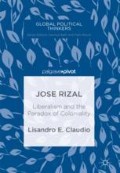Abstract
This chapter situates the life of Jose Rizal. First, it examines the origins of Philippine liberalism in the creole intellectuals of the late eighteenth century/early nineteenth century. It explains how these creoles, inspired by the French Revolution and other liberal movements in Europe, articulated the broad contours of the propaganda movement that Rizal would lead in the nineteenth century. Second, it provides an overview of the political and economic changes in the Philippines during the late nineteenth century. It was a period of economic growth and political stagnation, creating a revolutionary atmosphere that would form not only the ideas of Rizal but also the Philippine Revolution of 1896. It ends with a brief biography of Rizal.
Access this chapter
Tax calculation will be finalised at checkout
Purchases are for personal use only
Notes
- 1.
The category “creole,” as we shall see, was more slippery in the Philippines. Unlike Latin America, there were fewer “pure” Spaniards in the Philippines, so creoles tended to marry more with the native “indio” population. Their offspring, however, continued to identify as “creoles” and were often associated with a form of liberal/nationalist politics known as “criollismo.” Nevertheless, Filipino creoles, like their American counterparts, became key figures in their country’s early nationalism.
- 2.
It is not surprising that these same provinces would rise up in revolt in 1896.
- 3.
Due to the introductory nature of this volume and the fact that it focuses on Rizal’s political thought, I will not be unable to devote much space to this historical/ethnological work. Interested readers may refer to the work of Filomeno Aguilar (2005), which remains the best critical examination of Rizal’s annotation of Morga’s work.
- 4.
Rizal’s struggles are similar to many present-day Filipino intellectuals who are more comfortable with English than Tagalog. See Ocampo, 1992, for an account of Rizal’s incomplete third novel.
- 5.
As we shall see in the next chapter, this repudiation became the basis for radical historians to dismiss Rizal as a reformist critic of revolution. It is clear, however, that Rizal’s primary objection centered on viability and not principle.
Bibliography
Abinales, Patricio N., and Donna J. Amoroso. 2017. State and Society in the Philippines. 2nd ed. Quezon City: Ateneo de Manila University Press.
Aguilar, Filomeno V. 2005. Tracing Origins: Ilustrado Nationalism and the Racial Science of Migration Waves. The Journal of Asian Studies 64 (03): 605–637.
Anderson, Benedict R.O’G. 1983. Imagined Communities: Reflections on the Origin and Spread of Nationalism. London/New York: Verso.
———. 1998. The Spectre of Comparisons: Nationalism, Southeast Asia, and the World. New York: Verso.
Bernad, Miguel A. 1986. Rizal and Spain: An Essay in Biographical Context. Metro Manila: National Book Store.
Carr, Raymond. 1966. Spain, 1808–1939. Oxford: Clarendon Press.
Coates, Austin. 1992. Rizal, Philippine Nationalist and Martyr. Manila: Solidaridad Publishing House.
Corpuz, O.D. 1989. The Roots of the Filipino Nation, Volume II. Quezon City: Aklahi Foundation, Inc.
De Llobet, Ruth. 2009. El Poeta, El Regidor y La Amante: Manila y La Emergencia de Una Identidad Criolla Filipina. Istor: Revista de Historia Internacional 38: 65–92.
Guerrero, Leon Ma. 2012. The First Filipino: A Biography of Jose Rizal. Makati City: Guerrero Publishing.
Hau, Caroline S. 2017. Elites and Ilustrados in Philippine Culture. Quezon City: Ateneo de Manila University Press.
Joaquin, Nick. 2005. A Question of Heroes. Pasig City: Anvil Publishing Inc.
Kirsch, Adam. 2016. Melancholy Liberalism. City Journal, Winter. http://www.city-journal.org/2016/26_1_melancholy-liberalism.html
Legarda, Benito. 2011. The Economic Background of Rizal’s Time. The Philippine Review of Economics XLVIII (2): 1–22.
Mojares, Resil B. 2006. Brains of the Nation: Pedro Paterno, T.H. Pardo de Tavera, Isabelo de Los Reyes and the Production of Modern Knowledge. Quezon City: Ateneo de Manila University Press.
———. 2017. Interrogations in Philippine Cultural History: The Ateneo de Manila Lectures. Quezon City: Ateneo de Manila University Press.
Ocampo, Ambeth. 1992. Makamisa: The Search for Rizal’s Third Novel. Pasig: Anvil Publishing Inc.
Polasky, Janet. 2015. Revolutions Without Borders: The Call to Liberty in the Atlantic World. New Haven: Yale University Press.
Rafael, Vicente L. 2015. Introduction: Revolutionary Contradictions. In Luzon at War: Contradictions in Philippine Society, 1898–1902, ed. Milagros Camayon Guerrero, 1–19. Mandaluyong City: Anvil Publishing Inc.
Sarkisyanz, Manuel. 1995. Rizal and Republican Spain and Other Rizalist Essays. Manila: National Historical Institute.
Schumacher, John N. 1991. The Making of a Nation: Essays on Nineteenth-Century Filipino Nationalism. Quezon City: Ateneo de Manila University Press.
———. 1997. The Propaganda Movement: 1880–1895: The Creation of a Filipino Consciousness, the Making of a Revolution. Quezon City: Ateneo de Manila University Press.
Thomas, Megan C. 2012. Orientalists, Propagandists, and Ilustrados: Filipino Scholarship and the End of Spanish Colonialism. Minneapolis/London: University of Minnesota Press.
Author information
Authors and Affiliations
Rights and permissions
Copyright information
© 2019 The Author(s)
About this chapter
Cite this chapter
Claudio, L.E. (2019). Creolism and the Liberal Nineteenth Century. In: Jose Rizal. Global Political Thinkers. Palgrave Macmillan, Cham. https://doi.org/10.1007/978-3-030-01316-5_1
Download citation
DOI: https://doi.org/10.1007/978-3-030-01316-5_1
Published:
Publisher Name: Palgrave Macmillan, Cham
Print ISBN: 978-3-030-01315-8
Online ISBN: 978-3-030-01316-5
eBook Packages: Political Science and International StudiesPolitical Science and International Studies (R0)

